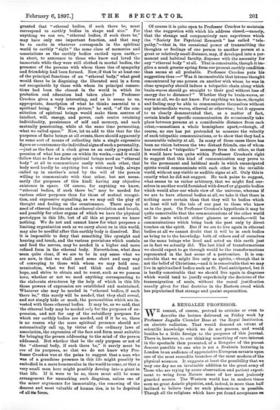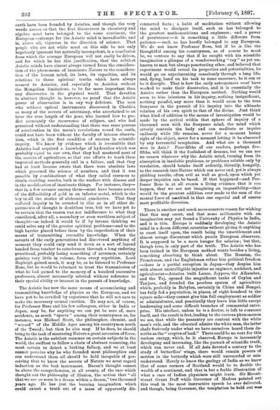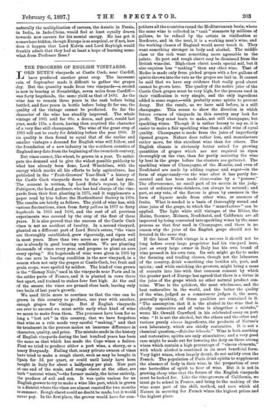A BENGALEE PROFESSOR.
WE cannot, of course, pretend to criticise or even to describe the lecture delivered on Friday week by Professor Jagadis Chunder Bose at the Royal Institution on electric radiation. That would demand an extent of scientific knowledge which we do not possess, and would besides be a little foreign to the purposes of this journal. There is, however, to our thinking something of rare interest in the spectacle then presented, of a Bengalee of the purest descent possible to one who is not a Brahmin lecturing in London to an audience of appreciative European savants upon. one of the most recondite branches of the most modern of the physical sciences. It suggests at least the possibility that we may one day see an invaluable addition to the great army of Those who are trying by acute observation and patient experi- ment to wring from Nature some of her most jealously guarded secrets. The Western world has in modern times seen no great Asiatic physicist, and, indeed, is more than half inclined to believe that no such phenomenon is possible. Though all the religions which have yet found acceptance on
earth have been founded by Asiatics, and though the very words assure us that the first discoverers in chemistry and algebra must have belonged to the same continent, the European contempt for the Asiatic mind is ineradicable, and is, above all, vigorous in the direction of science. That people who are not white must on this side be not only hopelessly ignorant but naturally incompetent, is a conclusion from which the average European will not easily be driven, and for which he has this justification, that the subtlest Asiatic minds have almost always turned from the considera- tion of the phenomena of inanimate Nature to the considera- tion of the human mind, its laws, its capacities, and its relations to those spiritual truths which have always seemed to Asiatics, and especially to Asiatics without the Mongolian limitations, to be far more important than any discoveries in the physical world. That devotion to abstract thought is, however, no proof that the Asiatic power of observation is in any way deficient. The men who without optical instruments discovered in Chalda so many of the secrets of astronomy, who ascertained to an hour the true length of the year, who learned how to pre- dict accurately the recurrence of eclipses, and who had perceived without understanding that there was some process of acceleration in the moon's revolutions round the earth, could not have been without the faculty of intense observa- tion, which is the first condition of success in scientific inquiry. We know by evidence which is irresistible that Asiatics had acquired a knowledge of hydraulics which was probably equal to our own, that they had mastered most of the secrets of agriculture, so that our efforts to teach them improved methods generally end in a failure, and that they had at least become aware that there were absolute laws which governed the science of numbers, and that it was possible by combinations of what they called essences to obtain startling results, both in the warfare with disease and in the modification of inanimate things. For instance, they— that is, a few savants among them—must have become aware of the diffusibility of gold in an inferior metal, which is the key to all the stories of alchemical quackeries. That they suffered inquiry to be arrested in this as in all other de- partments of thought is doubtless true, but we have yet to be certain that the reason was not indifference to what they considered, after all, a secondary or even worthless subject of thought—as indeed it would be if by intense thinking we could solve any of the greater spiritual problems—and to the high barrier placed before them by the imperfection of their means of transmitting recondite knowledge. When the savants of the early generations had discovered anything of moment they could only send it down as a sort of legend handed from teacher to catechumen through a long enduring priesthood, probably losing something of accuracy, certainly gaining very little in volume, from every repetition. Lord Rayleigh gained much, it may be, as he listened to Professor Bose, but he would be reluctant to trust the transmission of what he had gained to the memory of a hundred successive professors, almost necessarily selected without reference to their special ability or interest in the pursuit of knowledge.
The Asiatic has now the same means of accumulating and transmitting knowledge of physics as the European, and we have yet to be certified by experience that he will not care to make the necessary mental exertion. He may not, of course, for Professor Bose and his few colleagues, either in India or Japan, may be, for anything we can yet be sure of, mere accidents, as much "sports " among their countrymen as, for instance, was Michael Scott, the philosopher, chemist, and "wizard" of the Middle Ages among his countrymen north of the Tweed ; but then he also may. If he does, he should bring to the task of mastering Nature a great accession of force. The Asiatic is the subtlest reasoner on certain subjects in the world, the swiftest to follow a chain of abstract reasoning, the most certain to detect a lurking fallacy, and we at least cannot perceive why he who founded most philosophies and can understand them all should be held incapable of per- ceiving that to know the secrets of Nature we must regard induction as the best instrument. Bacon's thought cannot be above the comprehension, at all events, of the race which thought out the philosophy of illusion, the notion that " all that we see or seem is a dream within a dream," two thousand years ago. He has just the burning imagination which could extort a truth out of a mass of apparently dis-
connected facts ; a habit of meditation without allowing- the mind to dissipate itself, such as has belonged to the greatest mathematicians and engineers ; and a power of persistence—it is something a little different from patience—such as has hardly belonged to any European. We do not know Professor Bose, but if he is like the thoughtful among his countrymen, as of course he must be, we venture to say that if he caught with his scientific- imagination a glimpse of a wonderworking " ray " as yet un- known to man but always penetrating ether, and believed that experiment would reveal its properties and potentialities, he would go on experimenting ceaselessly through a long life, and, dying, hand on his task to some successor, be it son or be it disciple. That is how the early astronomers Mita have worked to make their discoveries, and it is essentially the Asiatic rather than the European method. Nothing would seem to him laborious in his inquiry, nothing insignificant, nothing painful, any more than it would seem to the true. Sunyasee in the pursuit of his inquiry into the ultimate- relation of his own spirit to that of the divine. Just think what kind of addition to the means of investigation would be made by the arrival within that sphere of inquiry of a. thousand men with the Sunyasee mind, the mind which utterly controls the body and can meditate or inquire- endlessly while life remains, never for a moment losing sight of the object, never for a moment letting it be obscured by any terrestrial temptation. And what are a thousand men in Asia ? Four-fifths of our readers, perhaps five- fifths, will think it the foolishest of dreams, but we can see no reason whatever why the Asiatic mind, turning from its: absorption in insoluble problems, or problems soluble only by revelation, should betake itself ardently, thirstily, hungrily, to the research into Nature which can never end, yet is always.. yielding results, often evil as well as good, upon which yet deeper inquiries can be based. If that happened—and Pro- fessor Bose is at all events a living evidence that it can happen, that we are not imagining an impossibility—that would be the greatest addition ever made to the sum of the- mental force of mankind in that one especial and of course- most profitable direction.
There is another and much more concrete reason for wishing. that this may occur, and that some millionaire with an, imagination may yet found a University of Physics in India, and it is this. Europe is suddenly developing the Asiatic- mind in a dozen different countries without giving it anything to exert itself upon, the result being the unsettlement and almost savage discontent which puzzle European observers. It is supposed to be a mere hunger for salaries ; but that,. though true, is only part of the truth. The Asiatic who has been trained in the European method wants besides a living,. something absorbing to think about. The Russian, the. Frenchman, and the Englishman refuse him political freedom —there is a partial exception in Japan—they despise him with almost unintelligible injustice as engineer, architect, and' agriculturist—Asiatics built Luxor, Jeypore, the Alhambra,. and the Taj, opened the magnificent tanks of Ceylon and Tanjore, and founded the peerless system of agriculture which, probably in Babylon, certainly in China and Bengal, has fully fed a population, in places, of eight hundred to the square mile—they cannot give him full employment as soldier or administrator, and practically they leave him little except landowning and some difficult branches of commercial enter- prise. His intellect, unless he is a doctor, is left to consume- itself, and the result is fret, leading to the curious phenomenon we see, that while the peasantry are content with the white- man's rule, and the educated admire the white man, the latter chafe furiously under what we have ourselves heard them de- scribe as the " sceptre of lead." There could be no vent for this• useless energy, which, be it observed, Europe is incessantly developing and increasing, like the pursuit of scientific truth,. which can never end. If all Asia devoted a century to the- study of butterflies' wings, there would remain powers of motion in the butterfly which were still unrecorded or mis- understood. Merely to know the geology of India as we know- that of some corners of Scotland would be to double the wealth of a continent, and that is but a feeble illustration of what a race of Indian physicists might learn. Sir Mount- stuart Grant Duff while Governor of Madras pointed out this road in the most instructive speech he ever delivered,. and though, being Governor, the temptation be held out was naturally the multiplication of careers, the Asiatic in Persia, fin India, in Indo-China, would feel at least equally drawn towards new careers for his mental energy. He has got it somewhere bidden, though Europe is so sceptical, or if not, how does it happen that Lord Kelvin and Lord Rayleigh would frankly admit that they had at least a hope of learning some- what from Professor Bose ?








































 Previous page
Previous page